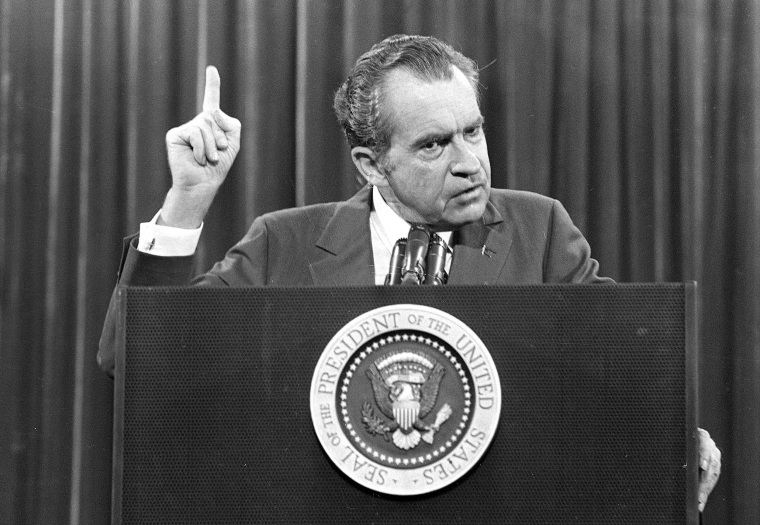Donald Trump has governed largely via executive orders — restricting immigration, imposing tariffs, weakening environmental regulations and freezing the pay of government workers, among other issues addressed by the 35 executive orders he issued in 2018 alone.
But he will almost certainly not follow the lead of President Richard Nixon by issuing an executive order to release the president’s own tax returns.
Trump, both as a candidate and as president, has steadfastly refused to release any of his federal income tax returns, despite assertions by Democrats in Congress that Trump’s tax returns would shed light on his financial entanglements. The new House Ways and Means Committee chair, Rep. Richard Neal, D-Mass., has said he plans to build a public case for the president to release them voluntarily before seeking to compel their disclosure.
Nixon also faced Congressional questions about his tax returns, but he pursued a different approach than Trump has to date.
On June 7, 1974 — a mere six weeks before the House Judiciary Committee adopted three articles of impeachment against him — Nixon issued Executive Order 11786, authorizing the release of his own federal income tax returns to the House Judiciary Committee in connection with its impeachment investigation. In addition to charges related to the Watergate cover-up, the committee was at the time considering whether Nixon had committed federal income tax fraud.
The fraud charge centered on charitable deductions taken on Nixon’s 1969-72 tax returns in the amount of $576,000, for the donation of his personal papers to the U.S. government. July 25, 1969 was the last date on which a donor was allowed this deduction, due to a change in the tax laws; investigators determined that the gift was made months after the deadline in April 1970. The IRS and the Joint Committee on Taxation then determined that the deed donating Nixon’s papers, which had been signed by a White House lawyer, had been backdated to 1969.
Thus, the IRS and the Joint Committee on Taxation disallowed the deductions; some Democrats on the Judiciary Committee argued that tax evasion based on having falsified the paperwork was an impeachable offense.
The House Judiciary Committee eventually voted on an article of impeachment jointly charging Nixon with tax fraud and violations of the Emoluments Clause of the constitution. The article was defeated in the committee by a vote of 26-12 in July 1974.
Trump is likely to fare no better, whether he opts to release his returns voluntarily or not. Should incoming Ways and Means Committee chair Neal follow through on his intention to seek Trump’s tax returns if they are not voluntarily provided, he simply has to ask Treasury Secretary Steve Mnuchin to provide them pursuant to a federal statute, 26 U.S.C. 6103, which directs the secretary to provide the return to committee for use in an executive (non-public) setting.
Trump supporters assuredly will argue that the committee has no legitimate basis to examine Trump’s tax returns, and Neal has admitted that he does not expect Mnuchin to immediately comply with the request voluntarily.
Whatever the validity of the argument that Neal’s committee has no rights to the returns, that argument would not apply to the House Judiciary Committee.
Trump’s tax returns are likely directly related to any impending impeachment investigation by that committee in two different ways.
First, the committee may decide to examine whether the Trump Organization’s business dealings with Russia, Saudi Arabia or other nations could have given foreign governments the ability to influence U.S. governmental actions.
Moreover, the committee would likely find the federal income tax returns of the Trump Organization highly relevant to any claim that Trump has violated the constitution’s Emoluments Clause, which prohibits the president, without the consent of Congress, from receiving a gift or emolument from a foreign government. The committee investigated that issue in the Nixon impeachment inquiry in a different context: Whether millions of dollars in government-paid improvements to his personal homes violated the constitution.
News reports certainly indicate, for instance, that Trump-branded hotels have pocketed significant revenues from foreign governments staying in Trump-owned properties, and an existing federal civil lawsuit brought by Congressional Democrats may determine whether foreign governments paying for services at Trump Organization hotels violates the Emoluments Clause.
Beyond any existing lines of inquiry, if the Trump White House were to stonewall a Judiciary Committee subpoena seeking his income tax returns, this refusal could serve independently as an impeachable offense — as it did with Nixon.
While Nixon allowed his tax returns to be sent to the Judiciary Committee, he stonewalled the committee’s subpoenas seeking White House tapes and documents. As a result, in addition to approving articles of impeachment based on Nixon’s obstruction of justice and abuse of power, the committee adopted a third article of impeachment due to Nixon’s interference with the constitutional prerogative of Congress to conduct an impeachment inquiry. Bluntly, the committee’s final report warned that presidential defiance of a subpoena in an impeachment proceeding is itself an impeachable offense.
If the Judiciary Committee launches an impeachment inquiry and subpoenas Trump’s tax returns, Trump will be forced to choose between two options. He can produce the tax returns — as Nixon did — for Congressional review or defy a Judiciary Committee subpoena seeking the tax returns, and potentially be impeached for his obstinance.
Trump’s battle plan to defy Congress — evidenced by the White House counsel recently hiring a platoon of lawyers for that task — foretells how this would turn out if an impeachment probe occurs. Trump would seemingly rather risk impeachment by flouting a Congressional subpoena for his tax returns than allow his financial affairs to be examined in the light of day.





